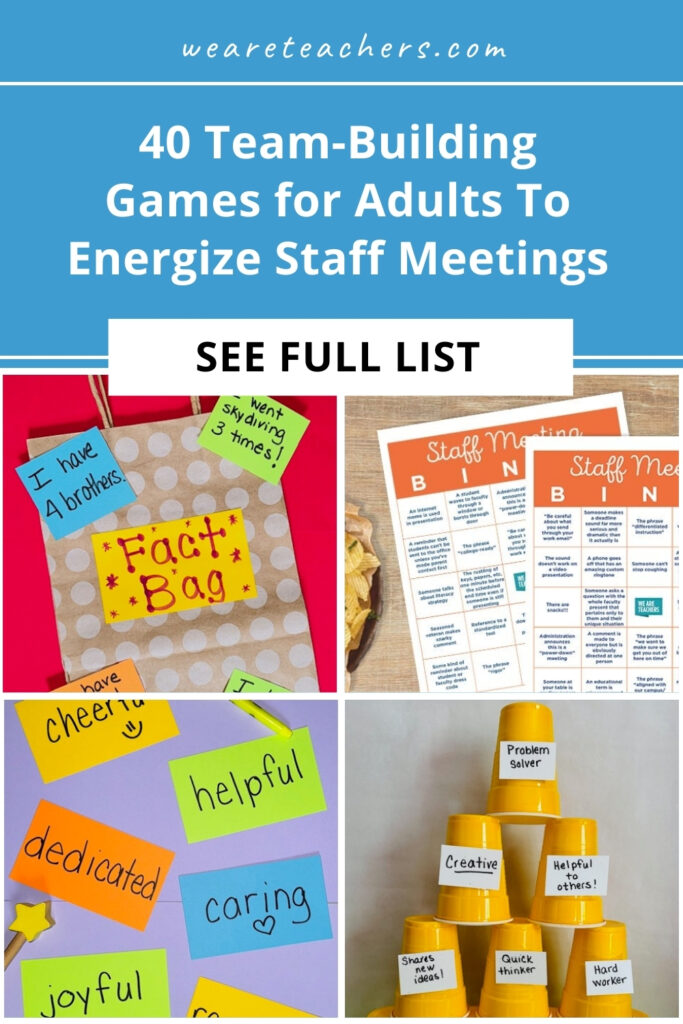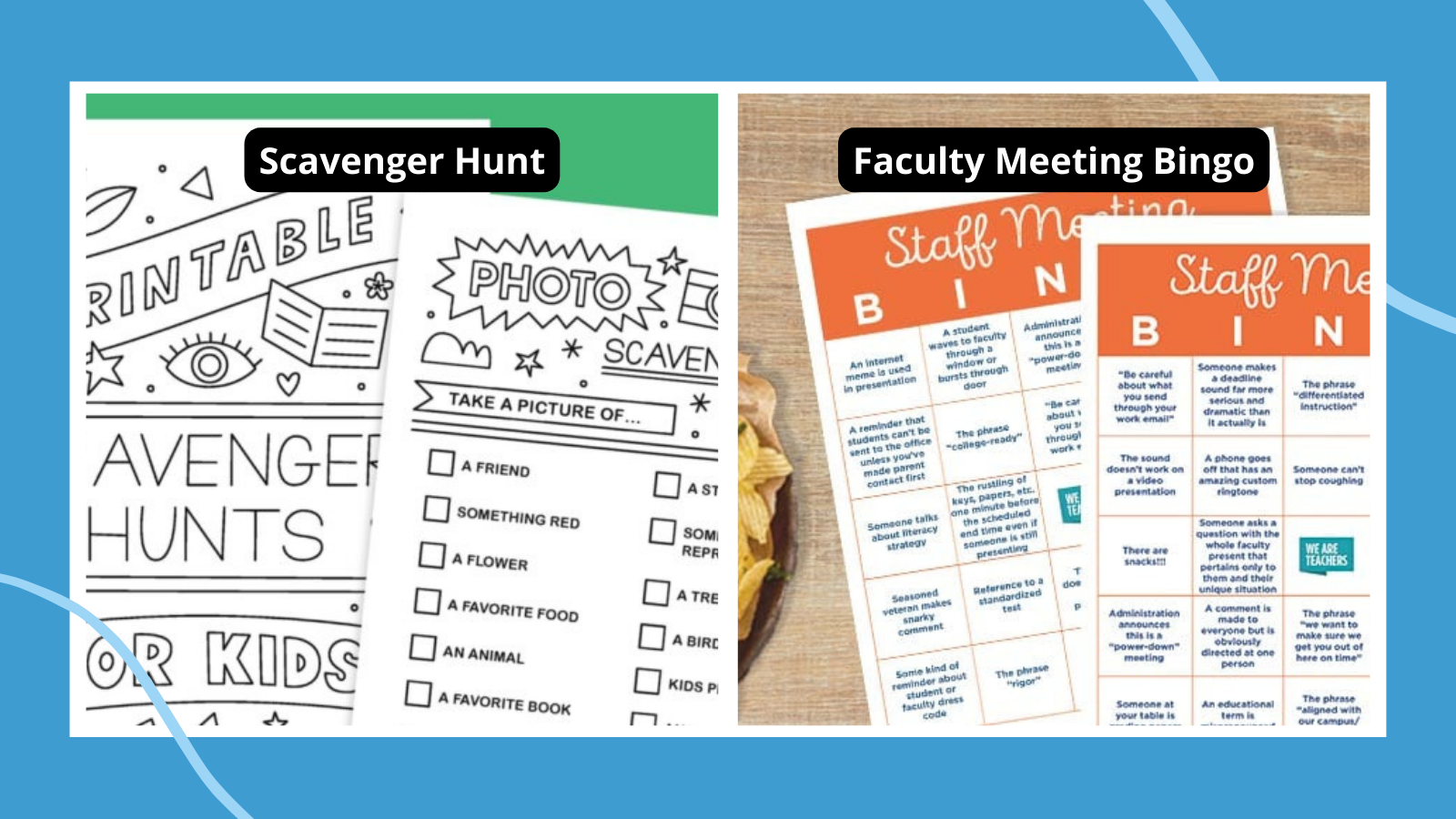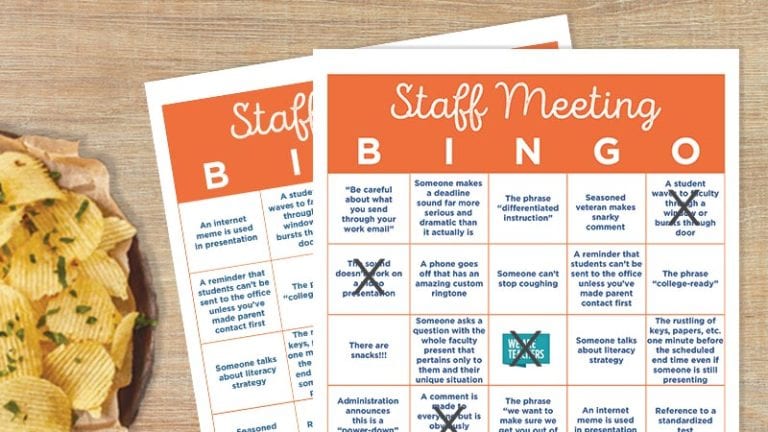Finding good team-building games for adults can be tricky, especially when it comes to school staff meetings. You might be working with a mixed group where some school staff already know each other while others are brand-new to the school. You’ll want to choose activities that get everyone interacting and talking right off the bat. Be sure to take into account that many teachers have overloaded schedules already, so try to choose exercises that provide real value. The right team-building games for adults help establish a sense of community and remind staff that when they work together, they can achieve more. Here is a selection to try with your own school staff.
Jump to:
- Icebreaker Team-Building Games for Adults
- Physical Team-Building Games for Adults
- General Team-Building Games for Adults
Icebreaker Team-Building Games for Adults
Use these team-building games for adults at the beginning of the school year when you want to integrate new staff with those who’ve been around for a while.
1. Faculty Meeting Bingo
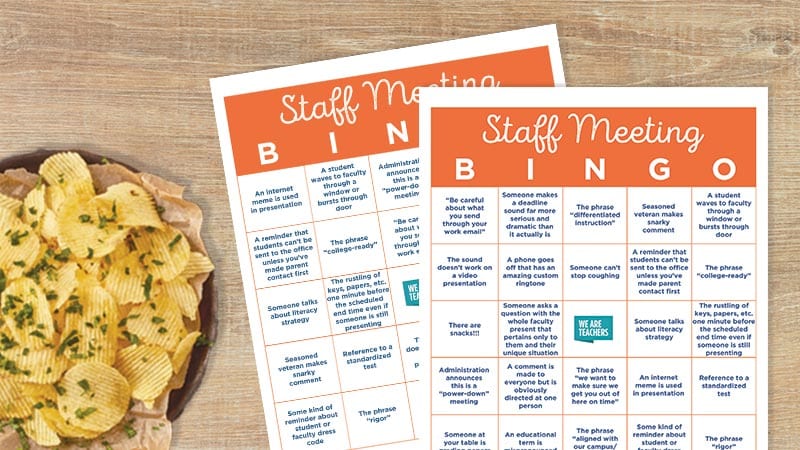
This is a low-stakes way to learn about new people or find out more about those you already know. Use your Faculty Meeting Bingo Cards to learn more about your coworkers, boost teacher engagement, and bring everyone together!
2. Say It Backwards
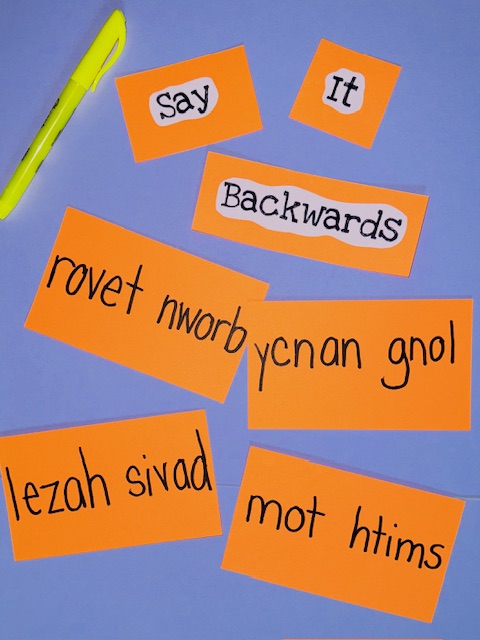
First, everyone in the group should write their first and last names backwards on a slip of paper. Then, select someone to pull a paper at random and read it. The first person to guess the name correctly is declared the winner!
3. Map It Out
This team-building activity would be especially good for a group from far and wide. You could also amend it for a local group by printing a map of your area of the state. Hang a map on a wall and then have each member of the team stick a pin on the spot where they were born. We think it will prove to be the perfect conversation starter!
4. Fact Bag
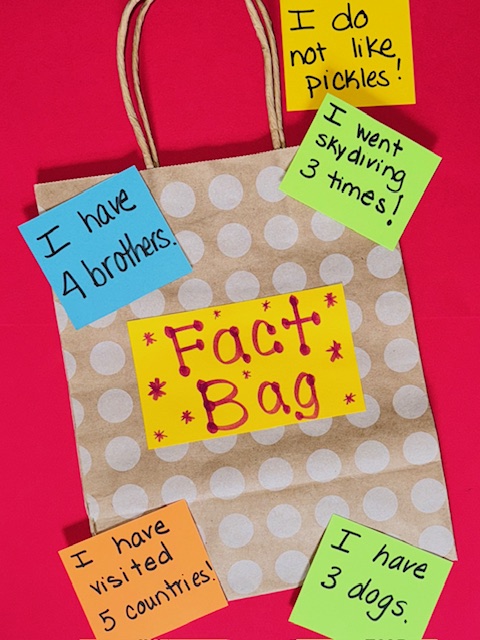
Pass out note cards or scrap paper, then ask your staff to each write down something about themselves they think no one in the room knows. Be sure they put their name on the card, then deposit all the cards in a bag. Mix them up, draw one, and read the fact aloud. Let the group try to reason out who they think matches the card. You can do all the cards at once or save the bag and draw a few at each staff meeting throughout the year.
5. Group Timeline
Before the meeting, draw a basic timeline on a whiteboard or long piece of paper. Include the date your school was built or your district was founded and add in other important local and global events too. At the meeting, pass out pads of sticky notes.
- Have each person write down their name and the date they started teaching (or working at a school) on one color, and add it to the timeline.
- On another color of sticky notes, have them add career changes (moving from first grade to fifth grade for instance).
- Add other events if you like (graduating from high school or college, when they knew they wanted to be a teacher, etc.).
Then, let the group review the timeline. It’s likely to launch a fascinating conversation about generational perception and how that shapes the experience of teaching students at your school.
6. Common Thread
Divide staff into groups of four. Give each group two minutes to chat among themselves and find something they all have in common (extend the time if needed). It could be that they all have kids, they hate recess duty, or they love watching football. Whatever the common thread, the conversation will help them get to know one another better. Have each group share their common thread with the whole room. Then, mix the groups up, and repeat as many times as you like.
7. Phone Pics Show-and-Tell
Give everyone three minutes to flip through the pics on their phone and choose one to share with the group. Then, have them share their pictures one by one, walking around the room to show everyone while explaining why they chose this particular picture. You can give this game some structure by asking them to focus on a favorite moment, a place they’ve been, or a photo of family or friends.
8. Greet Like a Stranger/Greet Like a Friend
This game is simple, but it’s a good way to get a new group comfortable with one another. Begin by having the group go around and greet one another as if they are meeting for the first time (and some of them just might be). You may choose to play some light-tempo music while they are greeting each other as strangers. Once they’ve done that, have them go around again, this time greeting one another as they would a good friend!
9. Two Truths and a Lie
This classic icebreaker is a fun way for staff to get to know each other better. Each person states three things about themselves: two truths and one lie. The rest of the group has to guess which statement is the lie. This game often leads to interesting and humorous revelations about your colleagues.
10. Speed Networking
Set up a series of one-on-one meetings where each pair has two minutes to chat before moving on to the next person. This fast-paced activity helps staff members get to know many colleagues in a short period of time. Provide a list of suggested questions to help spark conversations.
Physical Team-Building Games for Adults
There are a lot of team-building games for adults that get participants up and moving, but be sure to think inclusively when planning them. Not all staff members may be able to participate in overly physical activities. And while it can be fun to get a little silly, avoid games that put folks in embarrassing situations for no real purpose.
11. School Scavenger Hunt
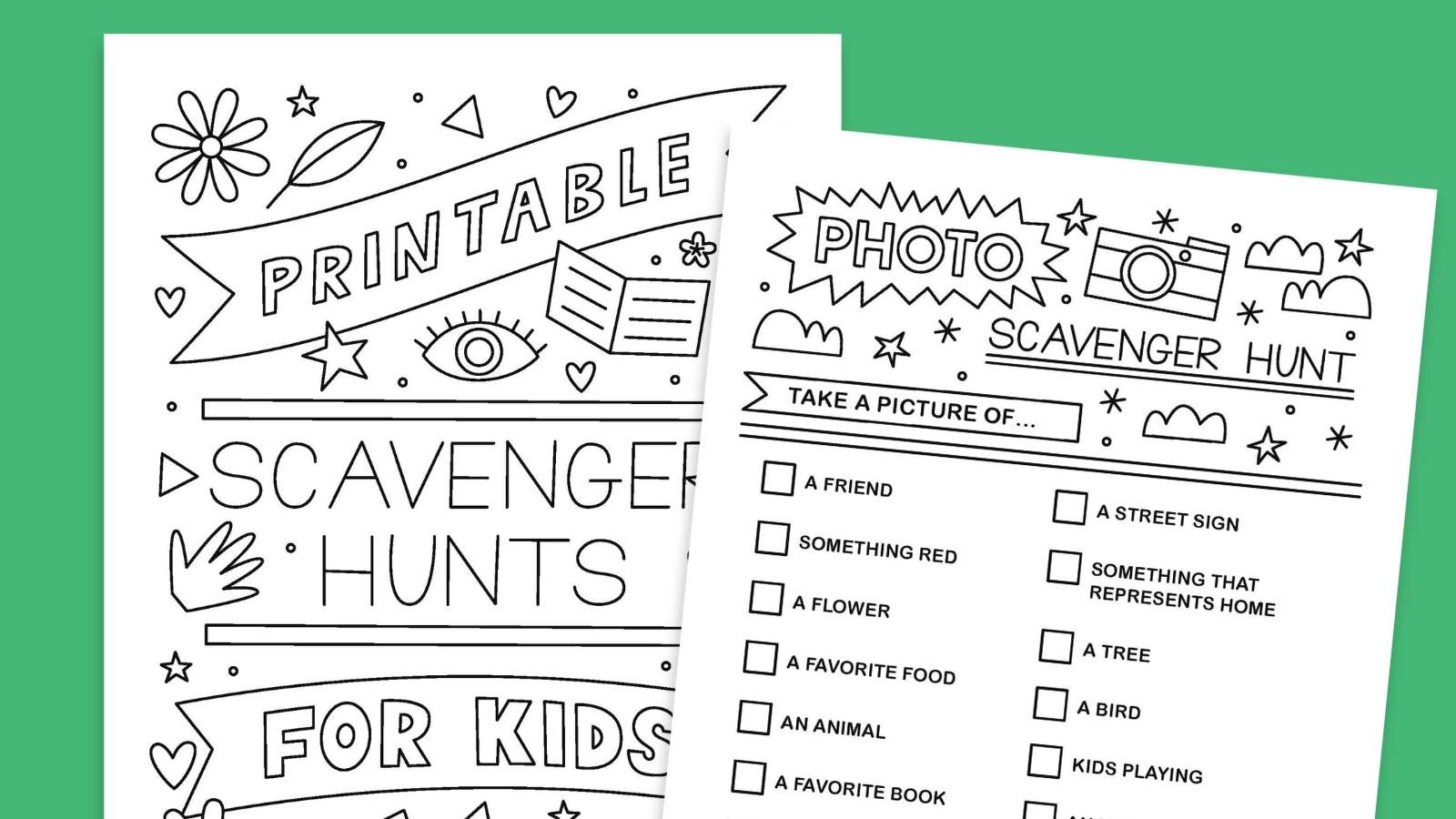
One way to help new staff acquaint themselves with the school, or encourage long-term staff to explore places they might not normally go, is with a good old-fashioned scavenger hunt! Review this list of clever ideas for inspiration and then write up a list of items that can be found around the school. Try to choose things that will send folks to various spaces. Think art supplies, gym equipment, lunch trays, and so on. The longer the list, the better.
Have groups work in teams, and be sure to pair new staff with old-timers. Give teams 15 minutes (or whatever time you choose) to gather as many items as they can. They can all go together or send people out in pairs. Award a prize to the winning team. Pro tip: Want to save time on returning things after the hunt is over? Have folks take pictures on their phone instead.
12. Traffic Jam
The goal of Traffic Jam is for each team to work their way across to the other side while following the rules. Rules include only occupying one space at a time and only being allowed to move one space at time. Just one wrong move can result in a jam (hence the name!) and everyone will have to start over. This game is a great way to get teams working together while having fun in the process!
13. No-Hands Cup Stack
Teachers may already be familiar with the cup stack game, a popular team-building activity for kids. The premise is simple: Attach four lengths of string to a rubber band, then have four people each grab one piece of string and use that to manipulate the rubber band around the plastic cups, building a pyramid. Give teams five minutes to see how many cups they can stack, or find out who can stack 10 cups the fastest.
14. Perfect Square
You’ll need one fairly long piece of rope or string for each group of four to six for this game. You can blindfold participants or ask them to keep their eyes closed throughout. The goal of the game is to use the piece of rope to form a perfect square, which is much harder than it sounds when you can’t see what you’re doing! Give them five minutes to complete the activity, then reveal the results. Communication is key with this one.
15. Follow the Leader
Ask for a volunteer guesser and have them leave the room. While they’re gone, choose a leader and have the group stand in a circle. The leader begins a movement, which the rest of the group must mimic. (For instance, the leader might jump up and down or wave their arms over their head.) Invite the guesser back in to stand in the middle of the circle as the movements continue. Every so often, the leader changes the movement, and the rest of the group follows. The guesser must try to determine who the leader is by watching the group’s actions closely. This is a good one for sharpening a teacher’s sense of finding the ringleader!
16. The Longest Shadow
Head outside on a sunny day for this game. Break your group into equal teams and tell them the goal is to arrange themselves in such a way that they cast the longest unbroken shadow. (For an extra challenge, require them to do this in silence!) During the debrief, encourage staff to use shadows as a metaphor to talk about the impacts individuals and teams have on a larger organization.
17. Team Jigsaw
You’ll need two very different jigsaw puzzles for this (keep them small, 100 pieces or less). Take a dozen or so pieces from each puzzle and add them to the other puzzle box. At your meeting, divide the group in two, and give each team a puzzle. At first, they’ll think they’re simply competing to complete their puzzle first, but eventually, they’ll realize that neither team can complete their puzzle without the help of the other. Allow them to exchange pieces as needed and help each other if they wish.
18. Sneak a Peek
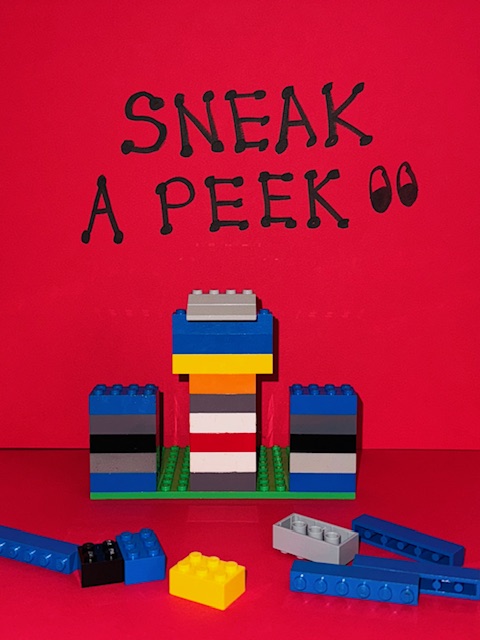
Grab some building blocks or LEGO bricks and build a structure, but keep it hidden from the group. Then, divide into teams, providing sets of the same materials used for the structure to each group. Allow one member of each team to come view the structure for 10 seconds, then return to their team and provide instructions based on what they remember. After one minute, allow a second person from each team to come view the structure for 10 seconds, then return and continue to help with the building. Repeat until everyone on the team has had a chance to see the original, or one team manages to duplicate it exactly.
19. Team Juggling
You’ll need a good amount of space for this activity. Grab three balls or stuffed animals (anything you can toss around), then have everyone sit or stand in a circle. One player starts by saying their own name, then throws a ball to another player, saying their name. Continue until each person has received the ball once. Then, repeat the process in the same order. But this time, after the item has been tossed a few times, add a second item into the mix, and then a third. Don’t be surprised when it turns into crazy chaos and gets everyone laughing!
20. Blind Drawing
Choose a picture of an item (a bicycle works well for this activity) and make enough copies for half your staff. At the meeting, have people pair up and sit back-to-back. Give one player the picture and the other a piece of paper and a pencil. The player holding the drawing gives directions to the other, trying to get them to replicate the picture, but without saying specifically what it is. The results are often hilarious and highlight how difficult it can be to give clear directions to other team members.
21. Team Pen
Your team needs to write a word, but you’ve only got one pen! Tie multiple strings to a single pen or marker and give each member one end of a string. They must work together to write a single word (TEAM is a good one). You can make things even harder by blindfolding some of the team members.
22. Paper Holding
Divide the group into four smaller groups, and then have each one designate two people to hold sheets of paper between them using different parts of their bodies (e.g., palms, knees). Everyone else on the team has seven minutes to see how many pieces of paper they can place between the two people without the papers falling. No two pieces of paper can touch and they also can’t touch the ground.
23. Human Knot
This activity requires physical closeness and collaboration. Have everyone stand in a circle and reach out to grab two other people’s hands at random. The goal is to untangle the “knot” without letting go of hands. It’s a great way to promote problem-solving and teamwork.
24. Four Corners
Label each corner of the room with a different category (e.g., favorite season, favorite type of music). Have everyone move to the corner that best represents their choice. This activity encourages movement and helps staff members discover shared interests.
General Team-Building Games for Adults
These games are quieter, simple to set up, and allow for easy participation from everyone in the group. Many of them work online too, so you can use them for Zoom staff meetings.
25. Escape Room
Escape rooms have become all the rage in recent years, but you don’t need to shell out big bucks to take your whole staff to one. Instead, look into escape room board games. You’ll find lots of them out there, and they make perfect team-building games for adults. Feeling ambitious? Use our guide and create your own escape room adventure for your team.
26. Deserted Island
Ask each person to decide what one item they would bring with them if they were stranded on a deserted island. They should not tell anyone which item they chose. Once everyone has decided, divide the group into teams of three or four. The teams should then work together to figure out how to survive and escape the island with only the items they decided to bring. Next, have each team share with the whole group. You can give prizes for the most creative, the most likely to work, etc., or just debrief at the end.
27. Would You Rather
Would You Rather is one of those hilarious games everyone has played at least once. Use our free Teacher Would You Rather questions to start conversations. You can also challenge your staff to come up with their own Would You Rather scenarios to share.
28. Problem-Solving
Teachers are no strangers to creative problem-solving, so they’ll love this team-building game! Pick four or more different objects, such as a chair, a potato peeler, a knit hat, and a chocolate bar. Divide staff into teams and present them with a crazy problem they must solve using only those items. For instance, they might have to figure out how to get a school bus out of a snowbank or fend off a herd of wild monkeys attacking their students. Then, have each team share their solution with the group and vote on everyone’s favorite.
29. Five Words
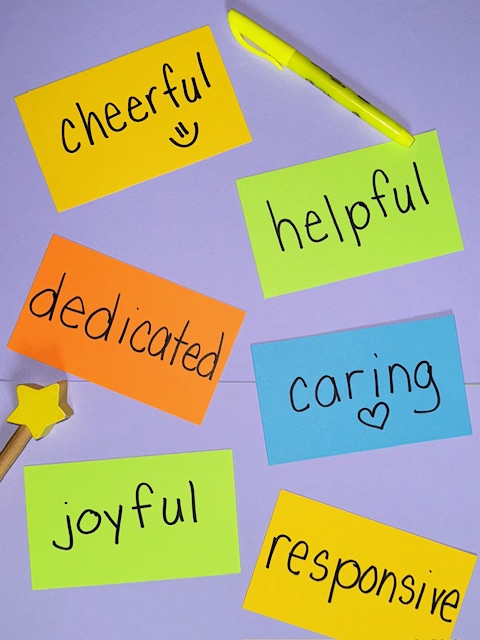
Give each player 10 note cards and a pen. On each card, have them write one word that they think describes the school culture. Put people together in pairs to discuss their words. After five minutes, each pair narrows their 10 cards down to the five they both like best. Now, turn the pairs into groups of four, and repeat. Continue until you’ve brought the entire group back together and collectively chosen the five words you all agree best represent your school.
30. Guess the Classroom
Before the meeting, have each teacher submit a photo of a space in their classroom (without students). They might choose a reading center, a current bulletin board display, or even their own desk. Assemble these photos into a slideshow. At the meeting, show the photos one by one and ask teachers to guess whose classroom they’re looking at. This is a great way to encourage teachers to go out and visit each other’s classrooms more often, while also learning more about how others use their space.
31. Dream Budget
Break the group into smaller teams and give each team a budget of $10,000. Tell them they’ve been given a new classroom, but it’s completely empty—no desks, no whiteboards, nothing at all. They have one hour to “shop” online and create their dream classroom from scratch. The only rule is that they have to stay within their budget. When they’re done, have each group present their proposal. It’s interesting to learn about what each teacher prioritizes in their classroom and maybe even discover something the school should budget for in the future.
32. Life Hacks
Every teacher has their own favorite tip or trick to make teacher life a little easier. Break the group into pairs or small teams and give them a piece of poster board or chart paper. Have them decide collectively on their favorite teacher life hack and make a poster to illustrate it. Then share them with the whole group and vote on your favorites!
33. Future Antiques
Any teacher who’s been around for a while can tell you about lots of items that used to be classroom staples but are rare sights nowadays. (TV/VCR carts, mimeographs, and even chalkboards come to mind!) In this game, your teams will guess which of today’s classroom must-haves will become “antiques” in 50 years. Have small groups choose an item and imagine it’s been discovered in a school time capsule 50 years in the future. First, have them explain how the item was used in the “good old days,” then have them describe the invention that’s replaced it. This one will make teachers laugh and remind them that things are always changing, often for the better.
34. Memory Wall
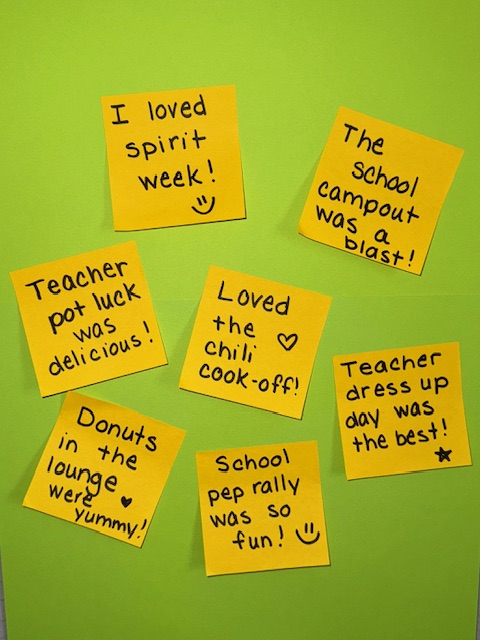
Team-building games for adults can be nostalgic, like this sweet one to try at your last staff meeting of the year. Give each member of the group paper and markers and ask them to write or draw (or both) their favorite memory from the school year. (Depending on the group size, you can have them each do more than one.) As they finish, invite them to add their paper to a large wall or bulletin board. When everyone is done, give them time to look at the wall together, reflecting on those memories. This is a sweet way to look back at the team’s successes.
35. Name That Tune
If the group is large, you can divide it into two even teams before getting started. Then, designate someone to either whistle, hum, or play an instrument to the tune of a popular song. The first team to correctly name the tune is declared the winner. Be prepared for some teasing if the school’s music teacher isn’t on the winning team!
36. Think Fast
Begin by projecting a number of varied items onto a screen. Each pair has about 15 to 20 seconds to look at the screen before they are taken away. Finally, they have to work together to write down as many of the items that were on the screen as possible. This is a great game for getting people’s brains working quickly, and we love that it will also encourage teamwork while pairs figure out different strategies for remembering as many items as possible.
37. Numbers Game
This game is perfect for larger groups. Before playing, you will need to have at least three sets of letter-size paper for the individual numbers 0 through 9. Divide the group into teams of 10 so each person on each team is holding their own number. Finally, call out a number, like 2,768,031, and see which group can form that number the quickest. Play until one team accumulates five points and is declared the winner.
38. Storytelling Chain
Start with a sentence prompt, and have each person in the group add one sentence to create a collective story. This game encourages creativity and listening skills. It can be done verbally or written down and read aloud at the end.
39. Silent Line-Up
Challenge your staff to line up in a specific order (by birth month, height, etc.) without speaking. This activity promotes nonverbal communication and cooperation. It can be more challenging and fun than it sounds!
40. Tower of Strengths
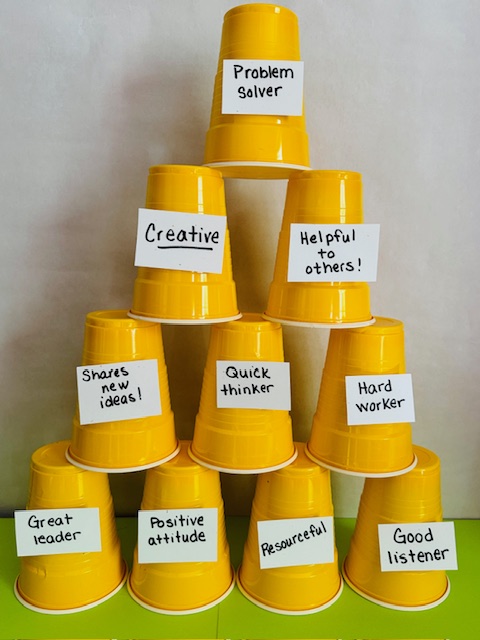
Provide each team with a set of building materials such as blocks, cups, or books, and tape. The goal is to build the tallest tower they can within a set time limit (10 minutes, for example). As they build, each team member must share one personal or professional strength and write it on a piece of paper or card, which they then tape to the building materials and add to the tower. This activity encourages sharing and recognizing each other’s strengths while working together to achieve a common goal.
What team-building games for adults has your school used successfully? Come share your experiences in the We Are Teachers HELPLINE group on Facebook.
Plus, check out these awesome team-building games and activities for kids.
